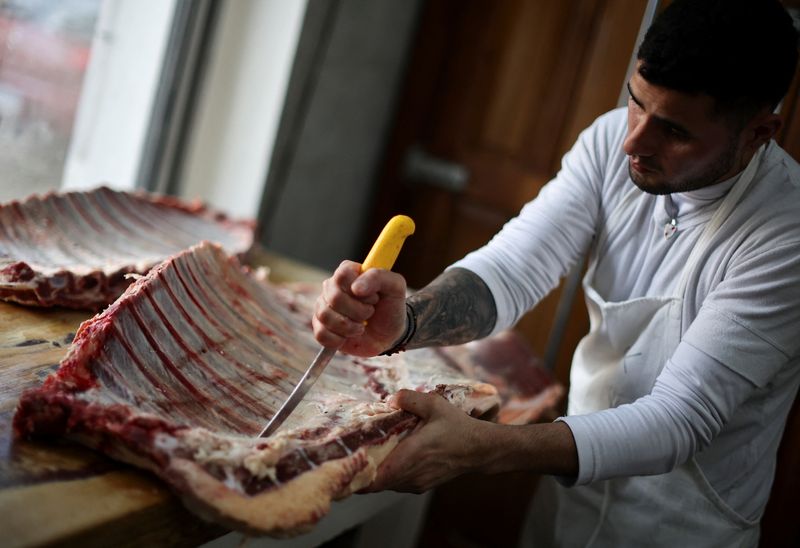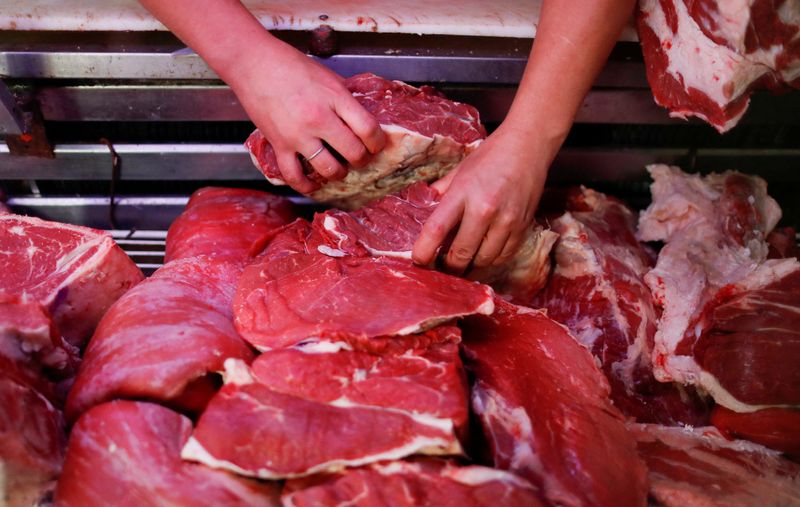By Candelaria Grimberg
BUENOS AIRES (Reuters) - Argentines, famed for steakhouses, sprawling cattle ranches and asado barbecues, are consuming less beef than ever, forced to tighten their belts by triple-digit inflation and a recession.
Beef consumption is down almost 16% this year so far in the South American nation where beef has always been an essential part of the social fabric, along with soccer and mate tea.
Many Argentine homes have in-built "parrilla" grills where families gather. Steakhouses dot street corners around Buenos Aires and people will huddle around make-shift barbecues for a taste of beef, even on construction sites or at protests.
"Beef is an integral part of the Argentine diet, it is as if pasta were eliminated for Italians," retiree Claudia San Martin, 66, told Reuters while waiting in line at the butcher shop. She said she was willing to cut back on other purchases such as cleaning products, but beef was sacred.
"Argentines can eliminate anything, I believe, in difficult times like this. But we can't do without meat," she said.
Still, the latest data show Argentines are this year eating beef at a rate of around 44 kilograms (97 lbs) per year, down sharply from more than 52 kg last year and as much as 100 kg a year in the 1950s.
Part of the long-term decline is a longer-term shift toward other meats like pork and chicken, as well as cheaper staples such as pasta. But this year's plunge has been driven by nearly 300% inflation and a stalling economy along with tough austerity measures by libertarian President Javier Milei.
Poverty is up, more people are homeless in major cities and lines have grown at soup kitchens. Many families have reduced consumption of staples like meat, milk and vegetables. They say they are yet to feel the benefit of slowing monthly inflation.
"The situation right now is critical. Consumer are taking decisions thinking just about their wallets," said Miguel Schiariti, president of local meat chamber CICCRA, who expected meat consumption to remain depressed.
"People's purchasing power is weakening month by month."
LESS MEAT, MORE PASTA
Out in the farmlands of Buenos Aires province, cattle ranchers are feeling the pinch.
"The drop in consumption is worrying," said Luis Marchi, 48, an agricultural engineer and the third generation to run the family farming business producing grains and livestock.
"Beef consumption has been dropping quite sharply recently," he added, blaming inflation and the economic slump. "Consumers try to replace beef with cheaper foods, other types of meat or pasta."
Another rancher, 53-year-old Guillermo Tramontini, said input costs had risen while drought last year hit many herds.
"Beef is not that expensive, but people's purchasing power has been reduced terribly," he said, adding farmers were being careful with capital expenditure to avoid firing workers.
As local consumption has slid, exports have risen, but weaker global prices have dampened the boost for farmers. By far the top buyer of Argentine beef is China, though it imports cheaper cuts not used domestically.
"The export sector is going through a very tough time even though it keeps exporting big volumes. Prices in the international market have fallen a lot," Schiariti said.
'CHEAPEST CUTS'
In his butcher shop in Buenos Aires where he has worked for 40 years, Gerardo Tomsin, 61, said people were still coming to buy beef, but were always hunting for cheaper deals.
"People keep coming, the issue is that they consume less. There are people who turn to other products. It is a permanent search for prices," he said.
Another butcher Dario Barrandeguy, 76, said people were buying the cheapest cuts of beef or other less expensive meats.
"The consumption of chicken and pork has increased a lot recently," he said.
Milei, a free market economist who calls himself an anarcho-capitalist, ended the previous Peronist government's freeze on beef prices.

"Things have become very expensive and when it's so costly we just don't buy," said Facundo Reinal, a 41-year-old teacher, adding it meant spending less time socializing around the grill
"We're seeing overall people doing fewer barbecues, which is a key part of the culture here in Argentina."
